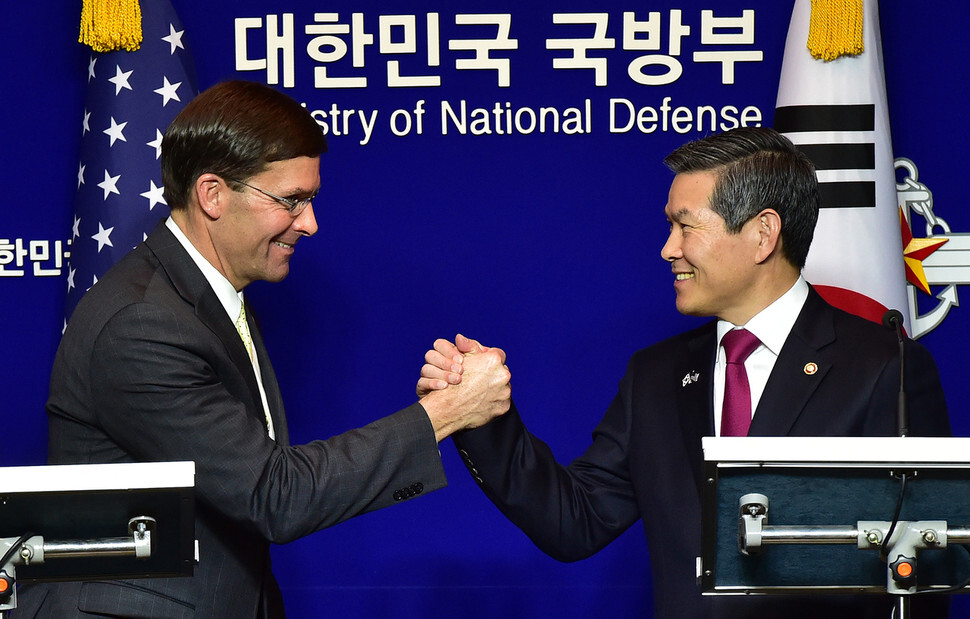hankyoreh
Links to other country sites 다른 나라 사이트 링크
US defense minister responds vaguely to questions on potential USFK withdrawal

US Secretary of Defense Mark Esper responded vaguely on Nov. 19 to questions about the possibility of US Forces Korea (USFK) reductions if defense cost-sharing negotiations with South Korea break down.
“I’m not going to prognosticate or speculate,” he said. Analysts said the US’ stance in repeatedly demanding a large increase in South Korea’s financial contribution to stationing US troops signals that Washington may be looking for leverage in the talks by subtly raising the specter of USFK cutbacks -- a matter that could provoke security fears in South Korea.
Appearing at a joint press conference with the Filipino defense minister in Manila that day, Esper was asked what the US’ next decision would be if no agreement could be reached on defense cost-sharing and whether it might consider military reductions on the Korean Peninsula.
“I'm not going to prognosticate or speculate on what we may or may not do [regarding the Special Measures Agreement (SMA) on defense cost sharing],” he replied.
“The State Department has the lead in these [defense cost] discussions, and I'm sure they are in capable hands. We just take this one step at a time,” he added.
Esper also reiterated his remarks a few days earlier that South Korea is a wealthy country that “can and should contribute more.” At the same time, he added that he would leave it for the State Department to reach a resolution on the particulars.
Esper’s remarks came shortly after a third round of defense cost-sharing negotiations in South Korea, scheduled for Nov. 18-19, ended after just 80 minutes after the two sides couldn’t reach an agreement. A joint communiqué issued just after the 51st South Korea-US Security Consultative Meeting (SCM) on Nov. 15 said that Esper had “reaffirmed the commitment to maintain the current level of the US military personnel in the ROK and to enhance combat readiness” -- but his remarks on Nov. 20 sent a different message.
While Esper did not directly confirm the possibility of USFK reductions, he may be seen as having hinted that the prospect of USFK reduction could be used as a negotiating tactic as the defense cost-sharing negotiations proceed. His remarks align with the subtle pressure exerted recently by US Joint Chiefs of Staff Chairman Mark Milley, who alluded to the possibility of USFK troops being withdrawn if South Korea doesn’t pay a larger share of defense costs.
“The average American looking at the forward deployed US troops in South Korea and Japan ask some fundamental questions [including] ‘Why are they needed there?,’” Milley was quoted as recently saying.
Commenting on Esper’s remarks, Cho Sung-ryul, a senior researcher for the Institute for National Security Strategy, said, “He is fanning fears of a ‘crisis in the South Korea-US alliance’ in order to influence South Korean public opinion.”
USFK withdrawal would draw heavy criticism from within WashingtonBut many observers have commented that the latest series of remarks about USFK from senior US officials not only contradict Washington’s past attitude emphasizing the South Korea-US alliance’s role as a “linchpin” for security in Northeast Asia, but also stand to actually damage that alliance.
“There is a lot of concern in the US as well about the [Donald] Trump administration potentially hurting the alliance,” Cho noted.
“If he messes with USFK, he’s going to run into criticism internally in the US,” he predicted.
A South Korean government official said, “The whole idea of the defense cost-sharing negotiations being handed to the Ministry of Foreign Affairs after being previously handled by the Ministry of National Defense was that the soldiers shouldn’t be bickering over money issues when they need to be fighting together against shared threats.”
“That sense of alliance among defense authorities needs to not be undermined,” the official said.
By Hwang Joon-bum, Washington correspondent
Please direct comments or questions to [english@hani.co.kr]

Editorial・opinion
![[Editorial] Yoon must halt procurement of SM-3 interceptor missiles [Editorial] Yoon must halt procurement of SM-3 interceptor missiles](https://flexible.img.hani.co.kr/flexible/normal/500/300/imgdb/child/2024/0501/17145495551605_1717145495195344.jpg) [Editorial] Yoon must halt procurement of SM-3 interceptor missiles
[Editorial] Yoon must halt procurement of SM-3 interceptor missiles![[Guest essay] Maybe Korea’s rapid population decline is an opportunity, not a crisis [Guest essay] Maybe Korea’s rapid population decline is an opportunity, not a crisis](https://flexible.img.hani.co.kr/flexible/normal/500/300/imgdb/original/2024/0430/9417144634983596.jpg) [Guest essay] Maybe Korea’s rapid population decline is an opportunity, not a crisis
[Guest essay] Maybe Korea’s rapid population decline is an opportunity, not a crisis- [Column] Can Yoon steer diplomacy with Russia, China back on track?
- [Column] Season 2 of special prosecutor probe may be coming to Korea soon
- [Column] Park Geun-hye déjà vu in Yoon Suk-yeol
- [Editorial] New weight of N. Korea’s nuclear threats makes dialogue all the more urgent
- [Guest essay] The real reason Korea’s new right wants to dub Rhee a founding father
- [Column] ‘Choson’: Is it time we start referring to N. Korea in its own terms?
- [Editorial] Japan’s rewriting of history with Korea has gone too far
- [Column] The president’s questionable capacity for dialogue
Most viewed articles
- 1Months and months of overdue wages are pushing migrant workers in Korea into debt
- 2Trump asks why US would defend Korea, hints at hiking Seoul’s defense cost burden
- 3At heart of West’s handwringing over Chinese ‘overcapacity,’ a battle to lead key future industries
- 4[Editorial] Yoon must halt procurement of SM-3 interceptor missiles
- 5Fruitless Yoon-Lee summit inflames partisan tensions in Korea
- 61 in 3 S. Korean security experts support nuclear armament, CSIS finds
- 7Dermatology, plastic surgery drove record medical tourism to Korea in 2023
- 8AI is catching up with humans at a ‘shocking’ rate
- 9First meeting between Yoon, Lee in 2 years ends without compromise or agreement
- 10Amnesty notes ‘erosion’ of freedom of expression in Korea in annual human rights report